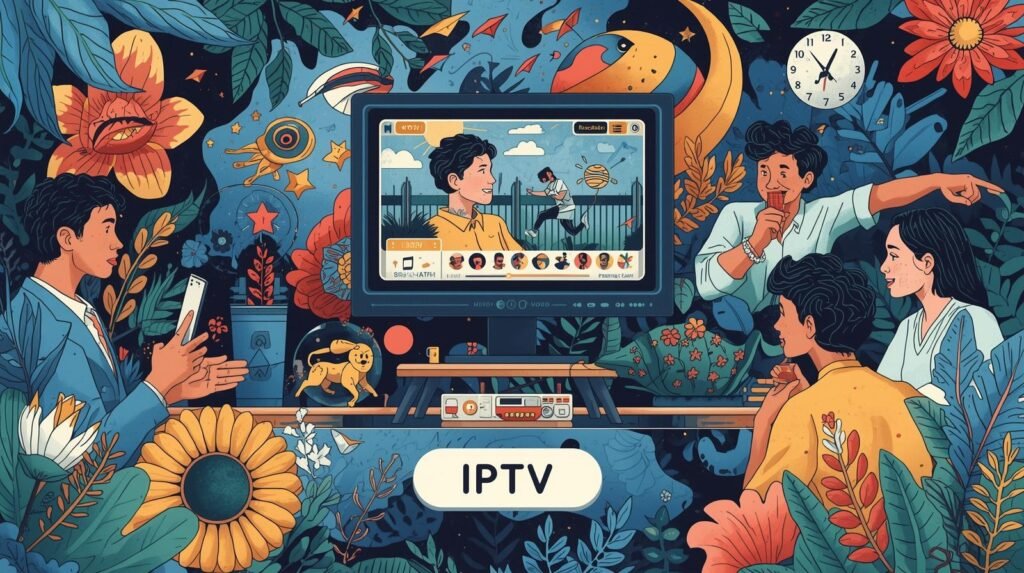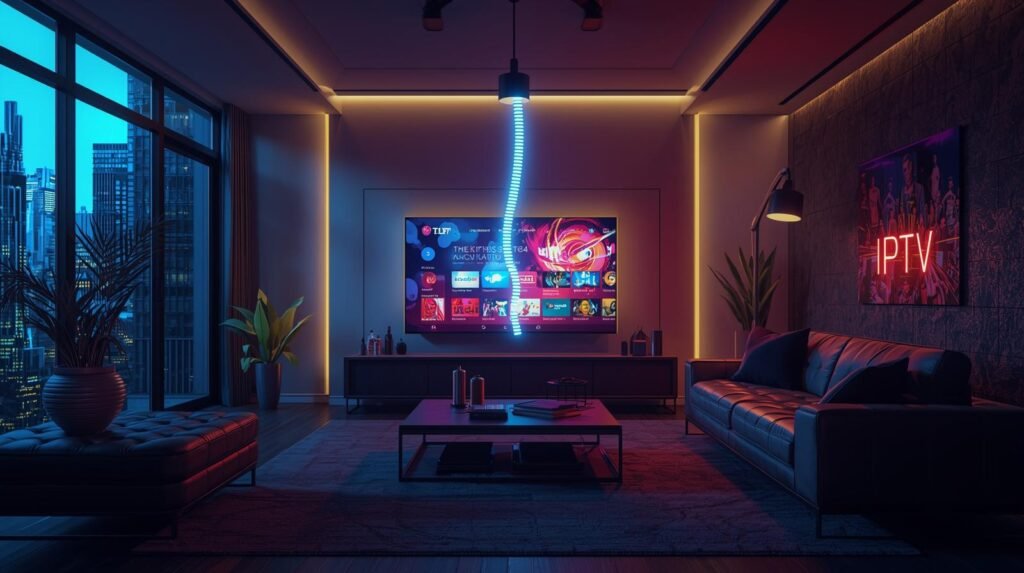Why More Brits Are Switching to IPTV
In recent years, the television landscape in the United Kingdom has undergone a seismic shift. Traditional cable and satellite subscriptions, once considered the gold standard for entertainment, are now being left behind as a growing number of Brits switching to IPTV . This movement, often referred to as “cutting the cord,” is redefining how people consume media, offering flexibility, affordability, and an unparalleled variety of content.
In this comprehensive article, we explore why IPTV is gaining traction in the UK, the benefits it brings, the challenges it faces, and what the future holds for this fast-evolving digital revolution.
What is IPTV
IPTV, or Internet Protocol Television, is a method of delivering television content over the internet rather than through traditional cable or satellite formats. Unlike conventional broadcasts that rely on fixed schedules, IPTVUK allows users to stream content on demand, access live channels, and explore exclusive libraries of movies and series.
The main driving factor behind its popularity is convenience. With Brits switching to IPTV, viewers can watch shows on smart TVs, smartphones, tablets, laptops, or streaming devices. The ability to switch seamlessly between devices has made IPTV the preferred choice for modern households, especially those who value mobility and personalization.
The Decline of Traditional TV in the UK
For decades, Brits relied heavily on BBC, ITV, Sky, and Virgin Media for their television needs. However, the traditional pay-TV model is losing steam for several reasons:
Rising Costs – Monthly IPTV subscription packages for satellite and cable services can be costly, often exceeding £50–£100 per month. IPTV offers much more budget-friendly alternatives without compromising on quality.
-
Limited Flexibility – Traditional TV ties viewers to fixed programming schedules. IPTV’s on-demand model gives users the freedom to watch content whenever they want.
-
Changing Viewing Habits – With the rise of streaming platforms like Netflix, Amazon Prime, and Disney+, UK audiences have grown accustomed to instant, ad-free entertainment. IPTV aligns perfectly with these evolving habits.
-
Cord-Cutting Movement – Just like in the US, the UK is experiencing a surge in cord-cutters who are ditching traditional TV subscriptions in favor of internet-based options.
Top Benefits of IPTV for British Viewers
Brits switching to IPTV brings a host of advantages that are driving its widespread adoption.

1. Greater Content Variety
Unlike traditional providers, IPTV services often include thousands of international channels, along with a massive catalog of movies, documentaries, sports, and TV shows. This variety ensures that every family member can find something they love.
2. Cost Savings
By cutting ties with cable and satellite companies, Brits are saving hundreds of pounds each year. IPTV subscriptions are significantly cheaper, with many offering premium features for a fraction of the cost.
3. On-Demand Flexibility
With UKIPTV , the days of being tied to rigid schedules are over. Viewers can pause, rewind, and re watch their favorite programs anytime. This flexibility is especially attractive to busy professionals and families.
4. Multi-Device Access
Whether at home or on the go, IPTV users can enjoy seamless access across devices. This cross-platform compatibility has become a cornerstone of modern entertainment.
5. Enhanced Features
Many IPTV services include features such as catch-up TV, video-on-demand, HD and 4K streaming, and personalized recommendations. These tools create a more interactive and immersive experience than traditional broadcasting.
IPTV and the Sports Revolution in the UK
One of the most significant reasons Brits are switching to IPTV is the way sports are consumed. Football, rugby, cricket, and Formula 1 are among the most-watched sports in the country, but traditional broadcasters often lock live matches behind expensive premium packages.
With IPTV, sports fans can:
-
Access live matches from leagues around the world.
-
Enjoy pay-per-view alternatives without committing to costly contracts.
-
Watch highlights and replays instantly.
-
Stream matches on multiple devices, even when traveling abroad.
This sports revolution is a major driver of IPTV’s success, giving fans greater freedom and accessibility than ever before.
Challenges and Concerns Around IPTV Adoption
While IPTV is rapidly growing in popularity, it also comes with challenges that must be acknowledged.

-
Internet Dependency – IPTV requires a strong, stable internet connection. In areas with poor broadband infrastructure, streaming may be affected.
-
Legality and Piracy Issues – Not all IPTV providers are licensed. Some offer pirated content, raising concerns about legality and cybersecurity. It is vital for users to choose legitimate IPTV services to avoid legal risks.
-
Technical Learning Curve – For those accustomed to traditional TV, learning how to set up IPTV apps and devices may feel overwhelming initially.
-
Service Reliability – Unlike satellite signals, internet streaming can sometimes face buffering or downtime during peak usage.
Despite these concerns, legitimate IPTV providers are working to address them by investing in server infrastructure, security measures, and customer support.
The Role of Streaming Giants in the IPTV Boom
Streaming platforms like Netflix, Amazon Prime Video, Disney+, and Apple TV+ have conditioned UK audiences to embrace internet-based entertainment. While these platforms are not IPTV in the strictest sense, they have paved the way for IPTV’s rise by normalizing subscription-based, on-demand viewing.
The combination of dedicated IPTV services and mainstream streaming platforms has created a hybrid entertainment ecosystem where viewers enjoy unparalleled choice, flexibility, and quality.
The Future of IPTV in the UK
As broadband speeds improve and 5G connectivity expands across the UK, the future of IPTV looks even more promising. Industry analysts predict that by 2030, the majority of UK households will rely primarily on IPTV services rather than cable or satellite subscriptions.
Future trends likely to shape IPTV include:
-
Ultra-High Definition (8K) Streaming – As technology advances, BRITISH IPTV will deliver even sharper and more immersive experiences.
-
AI-Powered Personalization – Smarter recommendation systems will tailor content based on viewing preferences.
-
Interactive Features – Expect more integration of social media, polls, and live chats within IPTV platforms.
-
Expansion of Legal IPTV Options – With demand soaring, more legitimate providers will emerge, giving consumers safer and more reliable choices.
Why More Brits Are Cutting the Cord Now
The combination of rising traditional TV costs, changing viewing habits, and the growing appeal of IPTV’s features is pushing more Brits to cut the cord than ever before. Whether it’s for affordability, flexibility, or content variety, IPTV is transforming the way households across the UK consume television.
The era of being tethered to a fixed schedule and costly subscription is fading. Instead, IPTV UK represents freedom, control, and endless possibilities for the modern viewer.
Final Thoughts
The UK is at the forefront of a digital entertainment revolution. Cutting the cord and embracing IPTV is no longer just a trend – it’s becoming the new standard. With its cost-effectiveness, vast content libraries, and advanced features, IPTV is rapidly establishing itself as the future of home entertainment.
As technology continues to evolve, IPTV will only become more accessible, more reliable, and more personalized, ensuring that Brits enjoy television in ways never before imagined to get IPTV FREE TRAIL .
